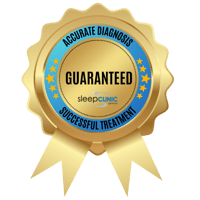Wake Up Call: Is Your Snoring Putting Your Health at Risk?

Do you snore every night? You’re not alone - in fact, 57% of people worldwide are affected by snoring¹. And, whether you're the snorer or the unlucky listener,the simple truth is that snoring is bad for you.
Snoring is not just an annoyance, it is the sound of your body struggling to breathe. Snoring is also a symptom of a more serious underlying health issue. In particular, persistent loud snoring is often a telltale sign of obstructive sleep apnea (OSA).
OSA is a condition where the airway becomes partially or completely blocked during sleep, leading to breathing interruptions. These interruptions not only result in poor-quality sleep but can also pave the way for a range of health complications.
In this article, we’ll learn about the potential health risks associated with snoring, and we’ll help you understand why it shouldn’t be ignored (and what to do about it).
What Causes Snoring?
Snoring occurs during sleep when the flow of air through the mouth and nose is partially blocked. It happens because the muscles in the throat, tongue, and soft palate (the soft part of the roof of your mouth) relax while you're asleep. When these muscles relax too much, the connected soft tissue can sag into and narrow the airway. This causes the tissues in the throat to vibrate as air passes through.
Several factors can contribute to snoring:
- Nasal Congestion (due to allergies, colds, or sinus infections)
- Obesity (the accumulation of fatty tissues in the throat and neck puts extra pressure on the airway and throat muscles, narrowing the airway)
- Sleeping on your back (gravity causes the base of the tongue and soft palate to collapse, obstructing airflow)
- Alcohol and Sedatives (relax the throat muscles)
- Structural Abnormalities (such as enlarged tonsils or a deviated septum)
Health Risks Associated with Snoring
What is often overlooked is that snoring can actually signal significant health concerns. One of the most concerning risks is the potential link between snoring and obstructive sleep apnea.
People with OSA face a higher risk of developing cardiovascular issues like high blood pressure, heart disease, and stroke. The repeated drops in blood oxygen levels during sleep apnea episodes can strain the heart, potentially leading to long-term consequences.
OSA is also associated with an elevated risk of diabetes, depression, and cognitive impairment.
Those with untreated sleep apnea are:

The Link Between Snoring and Sleep Apnea
While not all snorers suffer from OSA, nearly everyone with OSA… snores.
Sleep apnea affects 1 in 5 Australians, but what's frightening is that 80% of cases are undiagnosed.
Sleep apnea is diagnosed through a diagnostic sleep study, known as a polysomnogram. This measures various parameters such as breathing patterns, oxygen levels, and brain activity while you sleep.
OSA presents various symptoms beyond snoring. Other noticeable signs to look out for include:
- choking or gasping for air during sleep (indicating brief awakenings to restore breathing)
- excessive daytime sleepiness (leading to fatigue and difficulty concentrating)
- morning headaches (due to disrupted sleep patterns)
8 Ways to Tell if Your Snoring is Dangerous
Sleep specialists use a simple yet effective screening tool, known as the STOPBANG criteria, to assess the likelihood of someone having sleep apnea. Each letter in STOPBANG represents a specific question or criterion related to sleep apnea risk factors.
STOPBANG stands for:

Taking the STOPBANG test is crucial as it identifies individuals who are at higher risk of having sleep apnea. It's quick, easy, and available for free here.
Remember, it's a screening tool, not a diagnostic one. If your score is high, it indicates the need for further evaluation.
At Sleep Clinic Services, your health is our priority. We offer convenient at-home sleep studies, ensuring user-friendly diagnostics to successful treatment.
Taking Snoring Seriously for Better Health
If left untreated, snoring and sleep apnea can have serious health implications, including an increased risk of cardiovascular problems and other health conditions.
If you or someone you know snores persistently, it’s important to take it seriously and seek proper evaluation and treatment. Get in touch today for an obligation free chat with one of our friendly Care Coordinators, or schedule a call and we will call back at a time you choose.

What's it like getting a sleep study with Sleep Clinic Services?


















Care you can trust. For over a decade, Australia's best provider.

Get in touch
Are you ready to reclaim peaceful restorative sleep?
Wherever you are, we can help.
As Australia's leading provider of telehealth screening, diagnosis and solutions for 'sleep disordered breathing' sufferers, we care for people all around Australia.
Questions?
Call during business hours or fill in the form and we'll call you back at the time you choose. No cost, no obligation.


